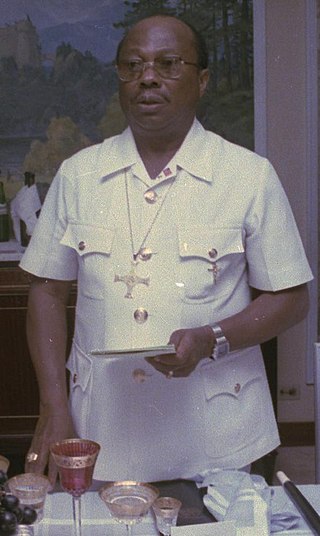Related Research Articles

The president of the Republic of Liberia is the head of state and government of Liberia. The president serves as the leader of the executive branch and as commander-in-chief of the Armed Forces of Liberia.

General elections were held in Liberia on 11 October 2005, with a runoff election for the presidency held on 8 November. The presidency and all seats in the House of Representatives and Senate were up for election. The elections were the first held since 1997 and marked the end of the political transition following the second civil war, having been stipulated in the Accra Comprehensive Peace Agreement of 2004. Ellen Johnson Sirleaf, former World Bank employee and Liberian finance minister, won the presidential contest and became the first democratically elected female African head of state in January 2006.
The Liberian Action Party was a political party in Liberia.

The Liberian People's Party (LPP) is a political party in Liberia.

The Unity Party (UP) is a political party in Liberia that was started in 1984 by Edward B. Kesselly, also its first standard bearer. Officially founded in Buchanan, Grand Bassa County, the party was established on 27 July 1985. The Unity Party participated in the first elections after the 1980 coup, running against President Samuel Doe in October 1985. The party has remained active in Liberian politics since and is the current ruling party following the 2023 Liberian general election.

The United People's Party (UPP) is a political party in Liberia. It formed in the 1980s as a successor to the Progressive Alliance of Liberia (PAL) and the Progressive People's Party (PPP), but was initially banned under President Samuel Doe because of its "socialist leanings".

General elections were held in Liberia on 19 July 1997 as part of the 1996 peace agreement ending the First Liberian Civil War. The presidency, as well as all seats in the House of Representatives and the Senate were up for election. Voter turnout was around 89%. Former rebel leader Charles Taylor and his National Patriotic Party (NPP) won the election with 75.3% of the vote, giving it about three-quarters of the legislative seats according to the proportional representation system. Taylor was inaugurated as president on 2 August 1997.

General elections were held in Liberia on 15 October 1985. They were the first elections since the 12 April 1980 military coup that brought Samuel Doe to power. During 1984, a new draft constitutional was approved in a referendum, which provided for a 58-member civilian and military Interim National Assembly, headed by Samuel Doe as president. After a ban on political parties was lifted, four parties – Doe's National Democratic Party (NDP), the Liberian Action Party, the Unity Party and the Liberia Unification Party – contested the elections.
The Liberty Party (LP) is a political party in Liberia. It first fielded candidates in the 2005 elections.
The Coalition for the Transformation of Liberia (COTOL) was a political coalition that was formed to contest the 2005 Liberian general election. Initially, COTOL consisted of the Liberian Action Party (LAP), Liberia Unification Party (LUP), People's Democratic Party of Liberia (PDPL), and the formerly dominant True Whig Party (TWP).
The Alliance for Peace and Democracy (APD) was a coalition of two Liberian political parties, the Liberian People's Party (LPP) and the United People's Party (UPP), that contested the 11 October 2005 elections.

The Free Democratic Party (FDP) is a political party in Liberia. It participated in the 1997 Liberian elections and fielded candidates in the 11 October 2005 elections.
The People's Democratic Party of Liberia (PDPL) is a political party in Liberia. It participated in the 1997 elections and fielded candidates in the 11 October 2005 elections as part of the four-party Coalition for the Transformation of Liberia (COTOL).

The Legislature of Liberia is the bicameral legislature of the government of Liberia. It consists of a Senate – the upper house, and a House of Representatives – the lower house, modeled after the United States Congress. Sessions are held at the Capitol Building in Monrovia. Legislature of Liberia is considered one of the three branches of government based on the Article III of the Constitution of Liberia that stipulates all three branches ought to be equal and coordinated based on the Principle of checks and balances.

General elections were held in Liberia on 11 October 2011, with a second round of the presidential election on 8 November. The presidency, as well as all seats in the House of Representatives and half of the seats in the Senate, were up for election. The election was overseen by the National Elections Commission (NEC).

General elections were held in Liberia on 7 October 1975, alongside a simultaneous referendum on presidential term limits. In the presidential election, incumbent William Tolbert of the True Whig Party was the only candidate, and was re-elected unopposed. In the legislative elections True Whig Party candidates won all 74 seats in the House of Representatives unopposed. Voter turnout was around 80%.

The National Union for Democratic Progress (NUDP) was a political party in Liberia.

Senate elections were held in Liberia on 20 December 2014, with half the seats in the Senate up for election.

The Alternative National Congress (ANC) is a political party in Liberia.

General elections were held in Liberia on 10 October 2023 to elect the President, House of Representatives and half of the Senate. Incumbent president George Weah was eligible for a second term. No candidate won a majority in the first round, with Weah narrowly placing first over opposition leader Joseph Boakai, which meant both advanced to a runoff held on 14 November 2023. Boakai defeated Weah by just over one percentage point in the closest runoff in Liberia's history, and Weah conceded the election peacefully.
References
- ↑ "UP, LAP, LUP Merged…Ellen Says It's A Dream Come True". Archived from the original on 2011-07-17.